
The Covid Inquiry – Papers pick and choose
“It was always module 2 – on government decision-making – where the drama would be seen,” wrote Rhys Blakely and Kat Lay in The Times on Saturday. “A fortnight into the public hearings, it hasn’t disappointed.”
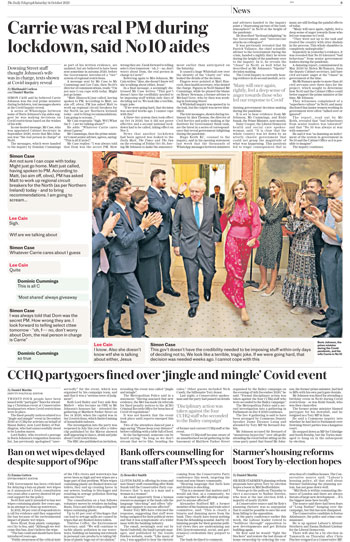
They ran through some of the highlights of the latest Covid inquiry sessions – Carrie Johnson being in charge, “tragic” chaos in 10 Downing Street, Rishi Sunak being called Dr Death by the woman who is now his chief scientific adviser. Some people, it seems, don’t bear grudges. Or perhaps Sunak was unaware of the slur until this week – or maybe Professor Angela Maclean put aside her reservations in the interests of career advancement.
Dame Angela turns out not to be one to mince her words: she also called anti-lockdown scientist Carl Heneghan a “fuckwit” in a message to fellow Sage member Professor John Edmunds, who told the inquiry that some 20,000 people died who might not have done had Boris Johnson and his then chancellor paid more heed to the Sage scientists and less to Heneghan.
Strangely, very little of Professor Edmunds’s evidence – which was truly shocking – found its way into print. Nor, to be fair, was much of what Heneghan had to say reported either. Apart from Carrie, rather than Dom, running the country, the cabinet secretary’s despair, and that Dr Death gibe about the Eat Out to Help Out scheme, the “drama” has had pretty short shrift across the national press. Including from the undisappointed Times, whose edited highlights made it only to page 22. The Mirror is the only paper to have led on the hearings since they resumed earlier this month.
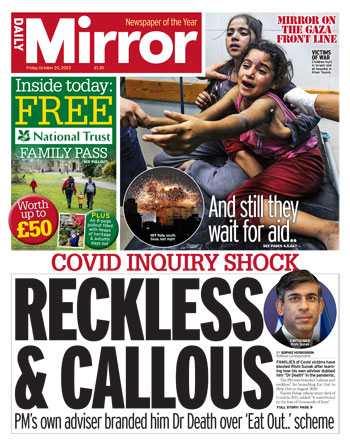
Well, there’s been a lot going on. Israel and Gaza have rightly commanded most attention. But there’s been room for Strictly and Holly and bedbugs and immigration. And it’s old news, isn’t it? We’ve all made up our minds about whether the Johnson administration did its best or its worst, whether it was competent, careless or plain negligent. Which is, of course, exactly what Mr J wanted us all to think when he kicked the inquiry as far into the future as he conceivably could. Lady Hallett’s hearings are likely to run for another two or possibly three years. The Swedish inquiry into its country’s handling of the pandemic has already reported.
I’m not a fan of public inquiries. When Leveson was set up, I described it in a blog as an expensive hiding to nothing. They tend to expose failings that we were already aware of and then come up with recommendations that, in spite of government promises at the outset, are frequently watered down or quietly forgotten. Until the next scandal. But they are necessary. They are often the only chance for ordinary people who have been served ill by the people responsible for their wellbeing to have their voices heard and have some hope of helping others to escape similar trauma in the future.
Sober vs sensationalist
It is important that we learn what the people who were making the decisions about the response to Covid were thinking and doing at the time; what advice was heard, heeded or discarded. And it is important that what is said in those hearings is reported properly. We need more than highlights and soundbites. In the old days (here she goes again), all the broadsheets would have given the best part of a page (even when space was at a premium) to sober, text-heavy reporting of each day’s proceedings. Of course there would be greater prominence for the big moments – Simon Case’s WhatsApps, Patrick Vallance’s diary – but the nitty gritty would be covered, too. Just as the day in Parliament was.
Now, presentation is everything, it all has to look pretty and “grab” the reader. The transition from the one to the other has been gradual over the past 30 years – accelerated, of course, by the arrival of the internet – and some would say it has been necessary to try to cling on to ever-declining readerships. But you do wonder sometimes whether those readers who have to be charmed with a thousand diversions are being put off not by the “boring” approach that has been jettisoned, but by all the fripperies that have put news in the back seat.
There is another facet of modern newspaper production at play here: let’s call it “attitude and agenda”. For some papers, no news story about public life and policy can be presented without pushing a party line, without telling the reader what to think. Whether it’s public sector strikes, the NHS, infrastructure investment, climate change, everything comes with baggage. For the Tory papers, there’s a gloss on what the government is doing – or is promising to do – and sneering at the opposition for not supporting it or dire predictions of how much more terrible it would be if they were in power. Meanwhile, the left-leaning titles do the exact reverse. Of course, each side has its view. But the days of reporting the policy initiative or event and then allowing columnists to chew it over in a partisan way on the opinion pages have long since gone. The opinion is all through the papers from front to back.
That’s not a new gripe. But we have gone beyond that. Now, these attitudes and agendas have infected the choice of what to report. With an election round the corner, it isn’t convenient for the right-wingers to focus too closely on what may have been blunders that may have contributed to a Covid death toll of some quarter of a million. So Professor Edmunds didn’t make it into print. (Please do go to the Covid Inquiry website and read or watch his evidence. I’m sure there are other witnesses worthy of similar attention, but I was alerted to Edmunds’ testimony by that evil social media.)
Following their own agenda
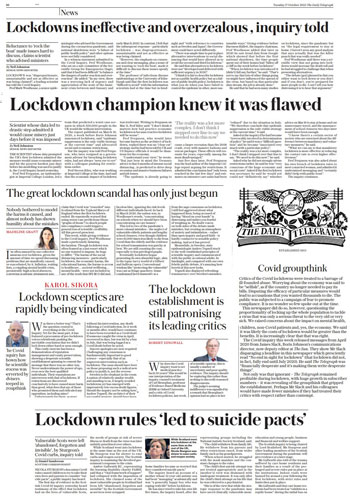
So we have a sort of wilful blindness as manifested in “there isn’t space, people aren’t interested, there are bigger stories”. But there’s another side to that coin, and that’s picking up on material that is useful for your agenda. That’s what the Telegraph, which has been more assiduous than most in reporting on the inquiry, has been doing. The Telegraph has been Covid-sceptic from the start and seriously anti-lockdown. This past couple of weeks, it has given readers headlines about “frightening the public”, about evidence that lockdowns were “disproportionate, unsustainable and not effective”, and about how “Professor Lockdown” Neil Ferguson “knew” that the lockdown strategy was flawed and would do harm.
Ferguson, who is widely thought to have promoted the policy, actually told the inquiry that he had not advocated it and merely presented the government with various scenarios. He also said that there was a “Chinese wall” between the Sage committee and the government so that the committee was “working in the dark” and given no clue as to ministers’ thinking or planning. This latter being the line preferred by the Guardian.

For the Guardian, too, is perfectly capable of adopting the line that best suits its editorial stance. Last Friday, when everyone else was ignoring Edmunds and focusing instead on “Dr Death”, the Guardian’s chosen angle was that documents had been released in which James Slack – a former Daily Mail political editor who had become Boris Johnson’s spokesman – said that the Mail and Telegraph had been agitating for an end to lockdown and for people to get back to the office because they were desperate to revive their flagging circulations (Slack is now the Sun’s deputy editor). An interesting approach for media types like us – but more important than the evidence of Sage members Edmunds and Professor Catherine Noakes and Oxford’s Professor Heneghan? Only Edmunds got the tiniest look in.
Indeed, Heneghan’s testimony warranted only the final par in even the supportive Telegraph’s coverage that day. But he fared better in the comment sections, with the oncologist Karol Sikora – who co-authored a letter to the prime minister with Heneghan, calling for “laser-sharp protection” for the most vulnerable while the rest of the country carried on as normal – saying Sage members had been guilty of “groupthink” and owed Heneghan an apology. The piece was headlined, “Lockdown sceptics are rapidly being vindicated”.
That day’s leader also attacked “groupthink”, but in this case, the target was Mr Slack and his WhatsApp aspersions about the Telegraph and its “desperation”. It had been profitable throughout the pandemic and subscriptions were rising, thank you very much. The paper had been subjected to ill-founded abuse and if the establishment had listened more to its criticism, rather than treating it with contempt, it might have made fewer mistakes. Because a journalist’s slight was definitely the central take-away from the previous day.
There was a further defence of Heneghan on Monday, this time from Robert Dingwall, who railed against the way the professor had been treated while giving evidence. Under the headline, “The lockdown establishment is still patronising its leading critics”, his piece urges people to watch the video to see for themselves how he was subjected to an “adversarial line of questioning”. To be fair, the somewhat abrasive way he was questioned was in marked contrast to the deference shown to Edmunds, who gave evidence immediately before him. So, yes, please do take a look or read the transcript. But my point here is that we have a series of people – Sikora, the leader writers, Dingwall – commenting on evidence that the paper has not chosen to report. If it’s significant enough to capture the attention of the commentators, shouldn’t readers of the news pages have been let into the secret from the start?
The same was true of the Express, where both Esther McVey and Carole Malone had opinions on things their readers wouldn’t have had a clue about. It just doesn’t seem right.
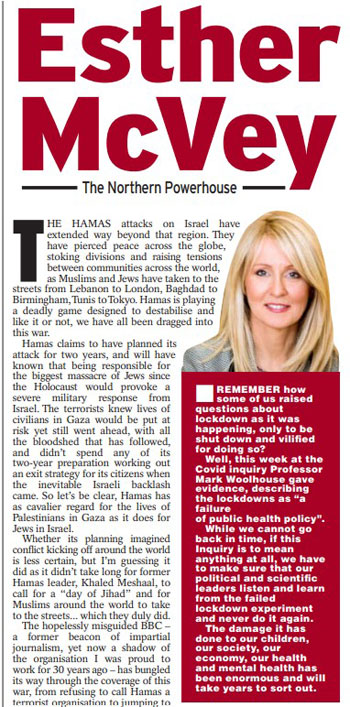
Horror in the Middle East
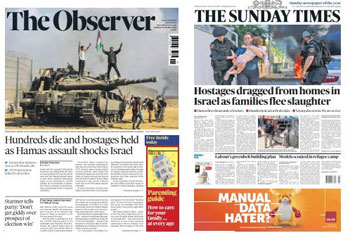
If some our papers have been less than enthusiastic in reporting the minutiae of Covid inquiry evidence, it may be because they have been preoccupied with the Middle East. And properly so. And sometimes not quite so properly.
When you’re caught up in the everyday coverage of a huge running story, it is easy to get carried away with the horror and the drama. It is also incredibly hard to convey human tragedies without appearing sensationalist or trite. When you use huge capital letters and big pictures to express outrage about a freed convict going about his daily life, where do you go when something truly outrageous is happening – not just once, but day after day? So, I’m not going to commend or condemn any paper for the way it has approached the actual events in Israel or Gaza.

I find it worrisome, though, that the human torment and the hand-wringing headlines are still surrounded by promotional material. It jars to see Kate celebrating England’s Euros success and Madonna in skin-tight costume for her tour above the headline “Fears of an all-out war”. The Mirror was not alone in this. While most reined back on the puffery for the initial assault and retaliation, nearly everyone reintroduced it as the days went by.
There is an uncomfortable reason for this: newspapers are businesses in a marketplace, they need to attract customers. And they know that, while people genuinely worry about what is going on in Gaza, they try to put it in the back of their minds as they go about their daily lives. Editors recognise this by trying to balance the “duty” coverage that they know many readers will skate over with what they believe potential buyers really want to read. It’s a far from easy task.

What concerns me even more is the way that some papers have taken these horrors as an excuse to promote or beat up ideological soulmates or opponents here in Britain. And, yes, the usual suspect is front and centre here. Looking back to Corbyn-era allegations of links between Labour and Hamas, questioning Keir Starmer about the sincerity of his criticism of the massacre, going on at the BBC for refusing to call Hamas a terrorist organisation on the basis of what was doubtless an act of terrorism (for those confused, a handy rule of thumb is that someone can be drunk without being “a drunk” – it’s the difference between a one-off and something perpetual and not the sort of judgment an impartial news organisation can or should make). People who have for years been telling Gary Lineker to shut up are now demanding to know why he isn’t speaking out.
Meanwhile, this is all grist to the Suella For Leader mill. There she was, a splash in four papers, having a go at the Met for not arresting people shouting “Jihad”, with only one – the Times – taking time to put high up the fact that Commissioner Mark Rowley had been asking for ages for the law to be changed to allow him to do just that.
It strikes me as unseemly, to put it mildly, when you take the sort of horrors that we are seeing on our screens every night and use them as ammunition in some petty squabble or to pursue a parochial political agenda.
1066 all over again
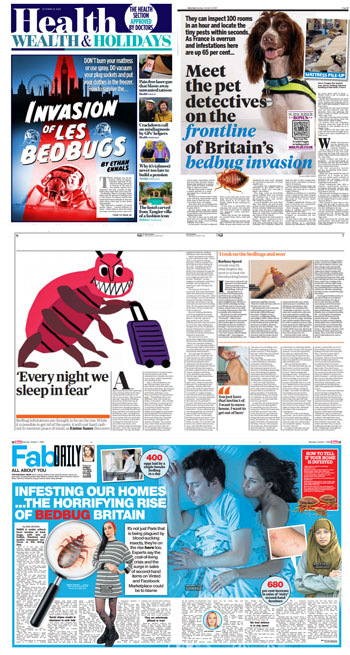
The other big story distracting the press from the Covid inquiry has been a French invasion. Of bedbugs. You have to hand it to papers when they go for something wholeheartedly. We’ve had sniffer dogs in the front line (I can forgive the Mail a great deal when it publishes big pictures of hero springer spaniels), we’ve had the lowdown on the bugs’ sneaky hide-in-the-wardrobe tactics, we’ve had guidance on how to deal with the menace and we’ve had stock market updates on Rentokil’s travails (the infestations don’t seem to have revived its fortunes, but that’s possibly because it’s many years since pest control was its core business). We’ve even had a link to the pandemic – the Evening Standard describing the phenomenon as “covid on legs”. The idea was that it was driving people away from the Tube and other crowded places in London, but still, a rather tasteless comparison, I think. A blotchy skin and itching, however uncomfortable, don’t quite equate with millions dead around the world.
The Mail on Sunday was so excited that it gave the bugs three pages the weekend before last and returned to them last Sunday. The Sun leapt at the chance to run yet another picture of a good-looking heterosexual couple in bed. Even the Guardian has joined in the fun. But for stories like this, there is really only one place to look: the Daily Star. It has been in its element, culminating yesterday in accusing Vladimir Putin of spreading fake news on social media to undermine France. This was a story from French intelligence sources that found its way into, shall we say, more conventionally reliable organs – like the Telegraph. The Star’s version was, naturally, the splash, with the glorious heading “Redbugs under the bed” and a grand total of 24 words of text, pointing to the “full” story and a leader inside.
This was the fourth splash on the bugs this month. That seems quite modest, given its predilection for psycho wildlife upsetting our equilibrium – especially when it comes from abroad, as it usually does. But it has also had to report on Martian mice and hairy-clawed crabs from China, so perhaps it should be forgiven. Here are some of its greatest hits.
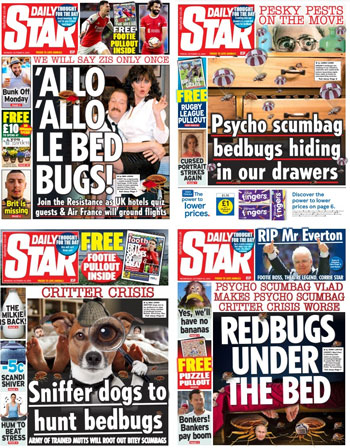
Front page of the fortnight
This is not the most dramatic front or the most eloquent headline since the Hamas attack that reignited the Middle East. But it captures the pain on both sides. This is refreshing from the Express, which swims in a pool of papers whose unequivocal support of Israel can lead them to overlook or sideline the suffering of innocent Palestinians.

Liz Gerard’s Notebook is a fortnightly column published in the InPubWeekly newsletter. To be added to the mailing list, enter your email address here.












